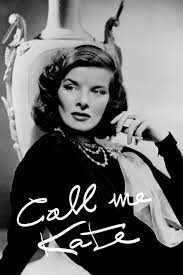
CALL ME KATE
you, 2023, 86 minutes, Colour.
Directed by Lorna Tucker.
This is a comparatively brief, 86 minutes, portrait of actress Katherine Hepburn, winner of four Academy Awards, the most in the academy history. She came to prominence in the early 1930s, won an Oscar in 1933, 12 more Oscars over 30 years later, and continued in film and television. She died in 2003 at the age of 96.
This film relies on some audio footage of interviews with the actress, some clips from an interview she did in 1973 with Dick Cavett, some comments from friends and some affably personal commentary from one of her grandnephew’s.
For those wanting a documentary about Katherine Hepburn screen career, this is not yet. There are clips from several films, her first with John Barrymore, A Bill of Divorcement, Sylvia Scarlet, Holiday, and, especially, The Philadelphia Story (and some attention given to playwright, Philip Barry, contacting her, her working with him on stage and for the screenplay, her buying the rights and selling them to MGM), her first film with Spencer Tracy, Woman of the Year, Adam’s Rib, Desk Set and, prominently with its message and the casting of her niece in the central role, Katherine Houghton, Guess Who’s Coming to Dinner. And, The Lion in Winter.
While this does give some idea of her screen career, it would have been interesting to note such films as Mary of Scotland, Tennessee Williams’ Suddenly, Last Summer, Eugene O’Neill’s massive, Long Day’s Journey into Night – and even a pleasant footnote of her being cast with John Wayne in Rooster Cogburn.
By the end of the film, many viewers may come to the conclusion that this is an interesting story but meeting Katherine Hepburn in real life would not necessarily have been so pleasant. She is strong and having good parents, praising her stern father, a very affirming mother, a happy childhood, something of a tomboy, the impact of the suicide by hanging of her oldest brother when he was 16, her decisions about education.
She asserts that she wanted to be famous – and that she achieved. She started in theatre, moved to cinema, many films in the 1930s, some box office failures where the media described her as “box-office poison”, comeback, The Philadelphia’s Story, her films with Spencer Tracy.
There is some background to her an ill-fated brief marriage, an attachment to her agent Leland Haywood but her deciding that she was not marriage material, long friendship with Howard Hughes, her friend Laura Harding who became companion and working for all kinds of aspects of the career, and the quietly proper Phyllis who became her assistant for many years. And, of course, there is the story with Spencer Tracy, elaborated here, her admiration for him, the meeting, working together with him, the relationship, his marriage, his drinking, their secrecy, the many films together, the final years, Guess Who’s Coming to Dinner and its strong theme of equality, his sudden heart attack and death, her giving way to Tracy’s wife for the funeral, wanting to be friends, but rejected and told by his wife to Hepburn that she thought was a rumour.
So, Katherine Hepburn was ambitious, an achiever, absolutely determined, shrewd in business, controlling, living life with certainty.